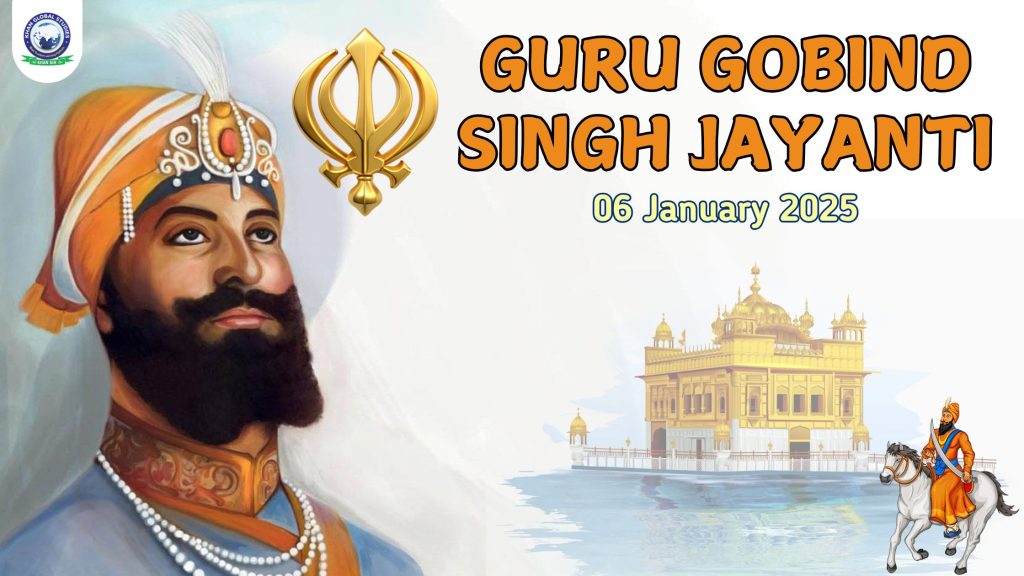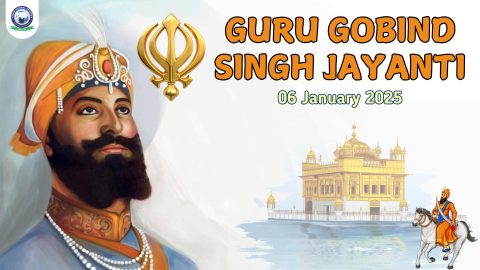Guru Gobind Singh Jayanti marks the birth anniversary of Guru Gobind Singh Ji, the tenth Sikh Guru. He was a remarkable spiritual leader, a fearless warrior, an inspiring poet, and a reformer who left an indelible mark on Sikhism. His life symbolizes sacrifice, resilience, and devotion to justice and equality. This day holds immense significance for the Sikh community and is celebrated with great devotion and reverence.
Early Life and Education
Guru Gobind Singh Ji (22 December 1666 – 5 January as per the Gregorian calendar) was born in Patna Sahib (now Patna city), Bihar. He was the only son of Guru Tegh Bahadur Ji, the ninth Sikh Guru, and Mata Gujri Ji, a pious and courageous woman. His birth name was “Gobind Rai.” At the tender age of nine, after the martyrdom of his father, Guru Gobind Singh Ji took on the leadership of the Sikh community.
Even as a child, Guru Gobind Singh Ji displayed exceptional bravery, devotion, and intellect. He received education in martial arts, horse riding, archery, and mastered multiple languages, including Persian.
In 1670, his family returned to Punjab and settled in Chakk Nanaki (now Anandpur Sahib), where he continued his education and spiritual training.
A Symbol of Faith and Valor
Guru Gobind Singh Ji’s life was marked by many challenges and sacrifices. In 1675, his father, Guru Tegh Bahadur Ji, was martyred for defending the religious freedom of Kashmiri Pandits against the tyranny of Mughal Emperor Aurangzeb. This moment marked a turning point in young Gobind Rai’s life, as he assumed the spiritual and temporal leadership of the Sikhs.
Guru Granth Sahib and Religious Contributions
Guru Gobind Singh Ji elevated the Guru Granth Sahib as the holy scripture of Sikhism and declared it the eternal Guru of the Sikhs. By doing so, he established a spiritual guide that would remain unaltered and timeless. Through his own writings and compositions, Guru Gobind Singh Ji emphasized the principles of righteousness, justice, and valor. His literary contributions, such as Chandi Di Vaar and the Dasam Granth, remain celebrated works that inspire courage and spirituality.
Establishment of the Khalsa Panth
One of Guru Gobind Singh Ji’s most significant contributions was the establishment of the Khalsa Panth, a spiritual and warrior community dedicated to protecting righteousness and combating oppression. On the auspicious day of Vaisakhi in 1699, at Anandpur Sahib, Guru Gobind Singh Ji initiated the Khalsa by baptizing the Panj Pyare (Five Beloved Ones) with Amrit (holy nectar).
He gave them the surnames “Singh” for men and “Kaur” for women, symbolizing courage, equality, and dignity. Additionally, he introduced the Five Ks (Kes – unshorn hair, Kangha – comb, Kara – iron bracelet, Kirpan – ceremonial sword, and Kachera – cotton undergarment), which became the articles of faith for every Khalsa Sikh. The Khalsa Panth fostered unity, equality, and self-discipline among Sikhs and prepared them to stand against tyranny.
Contributions of Guru Gobind Singh Ji
- Creation of the Khalsa Panth: The founding of the Khalsa Panth is considered Guru Gobind Singh Ji’s most outstanding achievement. Through this community, he united Sikhs, equipping them to defend their faith, fight injustice, and uphold the principles of equality and freedom.
- Religious Scripture: Guru Gobind Singh Ji compiled and sanctified the Guru Granth Sahib as the eternal Guru of the Sikh community. He declared that after him, no human would serve as a living Guru, and the Guru Granth Sahib would guide Sikhs spiritually and ethically.
- Valor and Sacrifice: Guru Gobind Singh Ji’s life was filled with sacrifices. He endured immense personal loss for the sake of justice and faith. His four sons (Chaar Sahibzaade) embraced martyrdom for the defense of righteousness. Two sons were martyred in the Battle of Chamkaur, while the other two were cruelly bricked alive by the Nawab of Sirhind. Despite these tragedies, Guru Gobind Singh Ji remained unwavering in his mission.
- Poetry and Literature: Guru Gobind Singh Ji was a prolific poet and writer, and his literary works continue to inspire people worldwide. Some of his prominent compositions include:
- Jap Sahib: A hymn extolling the qualities of God.
- Chandi Di Vaar: A ballad describing the divine battle between good and evil.
- Akal Ustat: A hymn celebrating the eternal nature of God.
His writings convey profound spiritual insights, valor, and moral teachings.
Sacrifice and Leadership
Guru Gobind Singh Ji’s life was filled with immense sacrifices and unparalleled leadership. His four sons (Chaar Sahibzaade) sacrificed their lives for the protection of faith and righteousness. Despite enduring personal tragedies, Guru Gobind Singh Ji remained steadfast in his mission to uphold justice and fight oppression. He led the Sikh community through 14 battles against the Mughal Empire and other adversaries, always standing for dharma (righteousness) and justice. His leadership united the Sikh community and inspired them to face tyranny with courage and resilience.
Death of Guru Gobind Singh Ji
Guru Gobind Singh Ji passed away in 1708 in Nanded, Maharashtra. He was fatally wounded in a conspiracy when an assassin attacked him. Although gravely injured, he remained resolute and continued to inspire his followers until his last breath. His passing marked the end of the lineage of human Gurus, but his courage, teachings, and vision had already empowered the Sikh faith to thrive independently under the eternal guidance of the Guru Granth Sahib.
Significance of Guru Gobind Singh Jayanti
Guru Gobind Singh Jayanti is celebrated with great devotion by the Sikh community worldwide. On this day, Sikhs gather in Gurdwaras to participate in kirtan (devotional singing), ardas (prayers), and to remember the life, teachings, and sacrifices of Guru Gobind Singh Ji. The day serves as a reminder of his unwavering commitment to truth, justice, and humanity.
Conclusion
Guru Gobind Singh Ji’s life is a beacon of inspiration for people of all faiths. He never bowed before injustice and sacrificed everything, including his family, to defend righteousness, humanity, and freedom. His teachings and ideals continue to guide and motivate individuals to walk the path of truth, courage, and selflessness.
Guru Gobind Singh Jayanti is not only a celebration for the Sikh community but also a symbol of universal inspiration, reminding us to stand for justice, equality, and righteousness.
“Waheguru Ji Ka Khalsa, Waheguru Ji Ki Fateh!”




